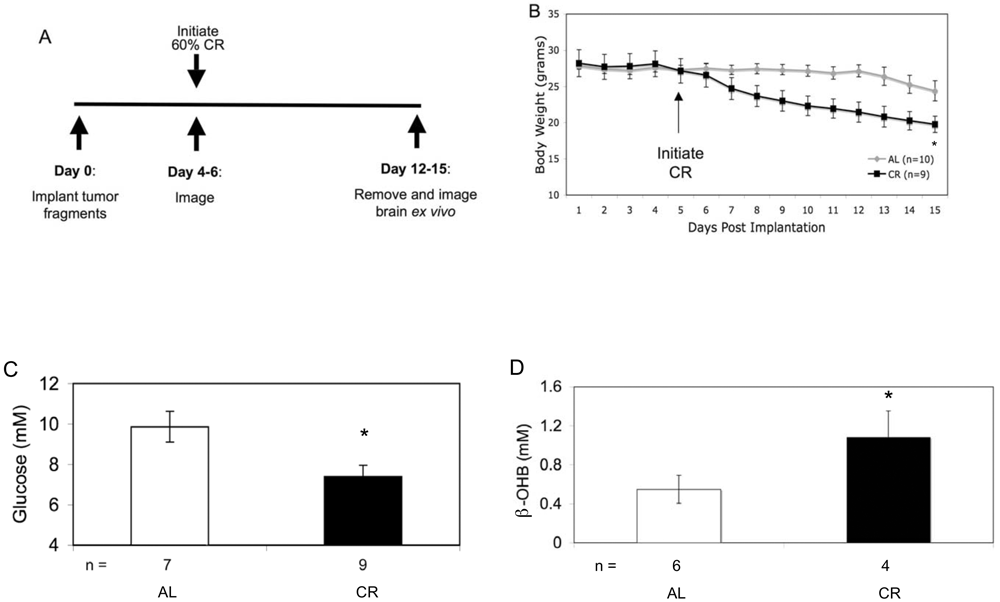As I said, CR-induced ketosis has been known to reduce non-invasive brain tumors. It appears that cancer cells are highly dependent on glycolysis for energy and for some reason (unknown to me, although I'm sure there's literature out there on it) seem incapable of mitochondrial respiration. As such, they cannot use ketones for energy like healthy cells can. Up until now, this hasn't been tested in more invasive cancers, where the tradeoff in neurological impairment might be worth it to stop or delay the spread of the cancer. This was the basis of a recent paper by Shelton et al., Calorie restriction as an anti-invasive therapy for malignant brain cancer in the VM mouse, in ASN Neuro. The authors developed a mouse model to test the effect of CR on the spread of glioblastoma multiforme, "the most malignant and invasive form of adult primary brain cancer," according to the authors.
(Most of this is self-explanatory, but figure D is measuring ketone levels. Click to enlarge.)
The mice were induced with the brain cancer, and then supplied food either ad libitum (as much as they cared to eat) or at 40% of their normal intake once per day. The mice were measured for body weight, blood glucose levels, and ketone levels, as well as several different tests for the location and abundance of tumor cells. The calorie restricted (CR) mice had lower body weights, lower plasma glucose levels, and higher ketone levels than the ad libitum (AL) mice, as expected.

As you can see above, the cancer cells (dark purple) are spreading further and more diffuse into the cortex in the AL mice than the CR mice. And as you can see below, the number of cancer cells in a given histological section of the brain were higher in AL than CR mice.

Finally, one very interesting finding is that the CR mice also experienced decreased angiogenesis (generation of blood vessels) in tumor areas than AL mice. Both density and diameter of blood vessels was reduced in CR mice.

As it seems, caloric restriction decreases tumor spread and angiogenesis in a malignant brain cancer mouse model. This is strong evidence that cancer cells have difficulty proliferating under metabolic stress, even when healthy cells are functioning normally. Metabolic control, where appropriate, can be a non-invasive treatment for benign and malignant brain tumors, although like all cancer treatments it isn't without significant risk. It is also worth mentioning that CR did not completely stop the spread of the malignant cancer, although it did slow it down significantly, so it is likely that CR would have to be used in tandem with other treatments.
Shelton, L., Huysentruyt, L., Mukherjee, P., & Seyfried, T. (2010). Calorie restriction as an anti-invasive therapy for malignant brain cancer in the VM mouse ASN NEURO, 2 (3), 171-177 DOI: 10.1042/AN20100002



















Interesting research! Am I wrong in thinking that the over-reliance on ketones was what lead to problems with the Atkins diet? And why it's important to eat carbohydrate based food for breakfasts, so your brain isn't reliant on the fat-based energy?
ReplyDeleteI don't do much human biology (work on microbes), so I tend to pick up random bits of health advice like that from medic friends.
[btw if you haven’t already, I’d suggest submitting this to the MolBio carnival, which is looking for blog posts. Link here: http://blogcarnival.com/bc/submit_10473.html ]
I don't know enough about the Atkins diet to say for sure, but even low-carb diets (low by today's standards, anyway) offer enough glucose to keep the brain from going into ketosis even when the body has. The problem arises when diets restrict you to NO carbohydrates (including carbs from fruit, etc).
ReplyDeleteThanks for the suggestion! I didn't know about that carnival, I'll go ahead and submit it. :)
Fascinating post!
ReplyDeletehttp://scienceexploits.blogspot.com